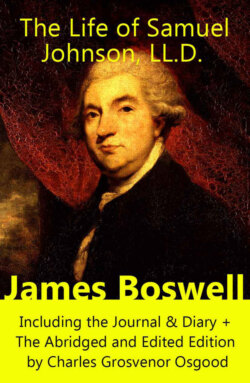Читать книгу The Life of Samuel Johnson, LL.D. - James Boswell - Страница 143
На сайте Литреса книга снята с продажи.
‘SAM. JOHNSON.’
Оглавление[Page 372: The accession of George III. A.D. 1762.]
[Page 373: Johnson’s pension. Ætat 53.]
The accession of George the Third to the throne of these kingdoms, opened a new and brighter prospect to men of literary merit, who had been honoured with no mark of royal favour in the preceding reign. His present Majesty’s education in this country, as well as his taste and beneficence, prompted him to be the patron of science and the arts; and early this year Johnson, having been represented to him as a very learned and good man, without any certain provision, his Majesty was pleased to grant him a pension of three hundred pounds a year[1105]. The Earl of Bute, who was then Prime Minister, had the honour to announce this instance of his Sovereign’s bounty, concerning which, many and various stories, all equally erroneous, have been propagated: maliciously representing it as a political bribe to Johnson, to desert his avowed principles, and become the tool of a government which he held to be founded in usurpation. I have taken care to have it in my power to refute them from the most authentick information. Lord Bute told me, that Mr. Wedderburne, now Lord Loughborough, was the person who first mentioned this subject to him[1106]. Lord Loughborough told me, that the pension was granted to Johnson solely as the reward of his literary merit, without any stipulation whatever, or even tacit understanding that he should write for administration. His Lordship added, that he was confident the political tracts which Johnson afterwards did write, as they were entirely consonant with his own opinions, would have been written by him though no pension had been granted to him[1107].
[Page 374: Johnson’s interview with Lord Bute. A.D. 1762.]
Mr. Thomas Sheridan and Mr. Murphy, who then lived a good deal both with him and Mr. Wedderburne, told me, that they previously talked with Johnson upon this matter, and that it was perfectly understood by all parties that the pension was merely honorary. Sir Joshua Reynolds told me, that Johnson called on him after his Majesty’s intention had been notified to him, and said he wished to consult his friends as to the propriety of his accepting this mark of the royal favour, after the definitions which he had given in his Dictionary of pension and pensioners[1108]. He said he would not have Sir Joshua’s answer till next day, when he would call again, and desired he might think of it. Sir Joshua answered that he was clear to give his opinion then, that there could be no objection to his receiving from the King a reward for literary merit; and that certainly the definitions in his Dictionary were not applicable to him. Johnson, it should seem, was satisfied, for he did not call again till he had accepted the pension, and had waited on Lord Bute to thank him. He then told Sir Joshua that Lord Bute said to him expressly, ‘It is not given you for anything you are to do, but for what you have done.’ His Lordship, he said, behaved in the handsomest manner. He repeated the words twice, that he might be sure Johnson heard them, and thus set his mind perfectly at ease. This nobleman, who has been so virulently abused, acted with great honour in this instance, and displayed a mind truly liberal. A minister of a more narrow and selfish disposition would have availed himself of such an opportunity to fix an implied obligation on a man of Johnson’s powerful talents to give him his support.
[Page 375: Murphy’s account of the pension. Ætat 53.]
Mr. Murphy and the late Mr. Sheridan severally contended for the distinction of having been the first who mentioned to Mr. Wedderburne that Johnson ought to have a pension. When I spoke of this to Lord Loughborough, wishing to know if he recollected the prime mover in the business, he said, ‘All his friends assisted:’ and when I told him that Mr. Sheridan strenuously asserted his claim to it, his Lordship said, ‘He rang the bell.’ And it is but just to add, that Mr. Sheridan told me, that when he communicated to Dr. Johnson that a pension was to be granted him, he replied in a fervour of gratitude, ‘The English language does not afford me terms adequate to my feelings on this occasion. I must have recourse to the French. I am pénétré with his Majesty’s goodness.’ When I repeated this to Dr. Johnson, he did not contradict it[1109].
His definitions of pension and pensioner, partly founded on the satirical verses of Pope[1110], which he quotes, may be generally true; and yet every body must allow, that there may be, and have been, instances of pensions given and received upon liberal and honourable terms. Thus, then, it is clear, that there was nothing inconsistent or humiliating in Johnson’s accepting of a pension so unconditionally and so honourably offered to him.
[Page 376: Johnson’s letter to Lord Bute. A.D. 1762.]
But I shall not detain my readers longer by any words of my own, on a subject on which I am happily enabled, by the favour of the Earl of Bute, to present them with what Johnson himself wrote; his lordship having been pleased to communicate to me a copy of the following letter to his late father[1111], which does great honour both to the writer, and to the noble person to whom it is addressed:
